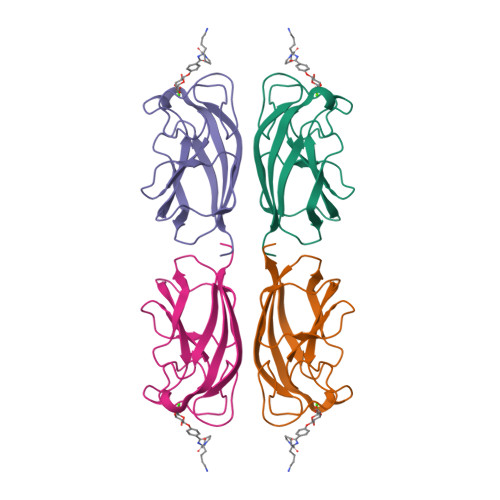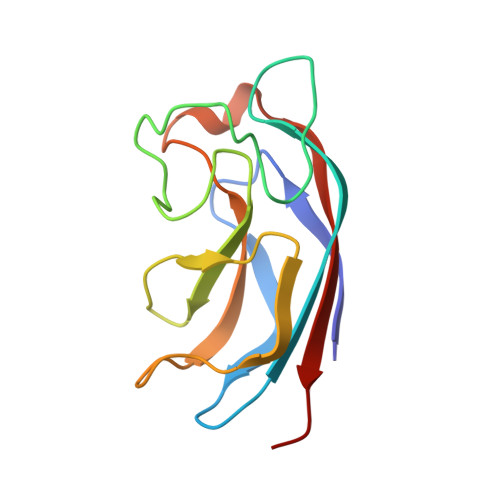Structural Insight into Multivalent Galactoside Binding to Pseudomonas aeruginosa Lectin LecA.
Visini, R., Jin, X., Bergmann, M., Michaud, G., Pertici, F., Fu, O., Pukin, A., Branson, T.R., Thies-Weesie, D.M., Kemmink, J., Gillon, E., Imberty, A., Stocker, A., Darbre, T., Pieters, R.J., Reymond, J.L.(2015) ACS Chem Biol 10: 2455-2462
- PubMed: 26295304
- DOI: https://doi.org/10.1021/acschembio.5b00302
- Primary Citation of Related Structures:
4YW6, 4YW7, 4YWA - PubMed Abstract:
Multivalent galactosides inhibiting Pseudomonas aeruginosa biofilms may help control this problematic pathogen. To understand the binding mode of tetravalent glycopeptide dendrimer GalAG2 [(Gal-β-OC6H4CO-Lys-Pro-Leu)4(Lys-Phe-Lys-Ile)2Lys-His-Ile-NH2] to its target lectin LecA, crystal structures of LecA complexes with divalent analog GalAG1 [(Gal-β-OC6H4CO-Lys-Pro-Leu)2Lys-Phe-Lys-Ile-NH2] and related glucose-triazole linked bis-galactosides 3u3 [Gal-β-O(CH2)n-(C2HN3)-4-Glc-β-(C2HN3)-[β-Glc-4-(N3HC2)]2-(CH2)n-O-β-Gal (n = 1)] and 5u3 (n = 3) were obtained, revealing a chelate bound 3u3, cross-linked 5u3, and monovalently bound GalAG1. Nevertheless, a chelate bound model better explaining their strong LecA binding and the absence of lectin aggregation was obtained by modeling for all three ligands. A model of the chelate bound GalAG2·LecA complex was also obtained rationalizing its unusually tight LecA binding (KD = 2.5 nM) and aggregation by lectin cross-linking. The very weak biofilm inhibition with divalent LecA inhibitors suggests that lectin aggregation is necessary for biofilm inhibition by GalAG2, pointing to multivalent glycoclusters as a unique opportunity to control P. aeruginosa biofilms.
Organizational Affiliation:
Department of Chemistry and Biochemistry, University of Berne , Freiestrasse 3, 3012 Berne, Switzerland.




















